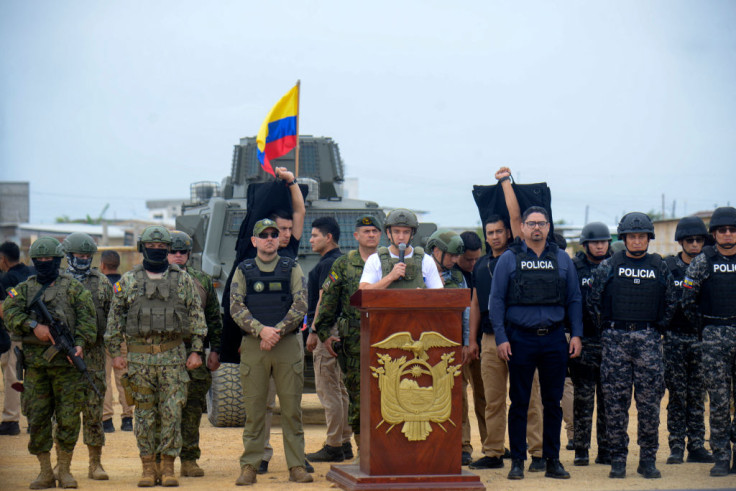
The term narco-state is theoretically given to countries where all legitimate institutions become contaminated by the unlawful businesses conducted by drug cartels or gangs. Over the past five years, Ecuador has slowly gone from a comparatively prosperous and safe Latin American country into one that fits the definition of narco-state in the region.
In recent years, Ecuador has been swept by a wave of organized crime and the increased activity of gangs that have focused on smuggling cocaine from Colombia to Europe using ports around the country. With these groups gaining both control and power in Ecuador, its status as one of Latin America's safest countries has been erased thanks to a homicide rate that has increased six-fold in the last five years.
According to a report from The Economist, Ecuador had a homicide rate of 6.7 per 100,000 inhabitants in 2019, a similar rate to the U.S. (5 per 100,000) but by 2023 that number skyrocketed to 45 per 100,000, making Ecuador the deadliest country in the Americas' mainland, only surpassed by Jamaica (49 per 100,000).
As criminal groups have gained power and notoriety, they have also adopted more vicious tactics similar to those from drug cartels in Mexico, including public hangings, decapitations and immolation. According to The Economist's Alexander Clapp, the situation has gotten so bad that gangsters in Guayaquil's poor neighborhoods have resorted to cutting the tongues out of children to prevent them from becoming police informants.
More than 8,000 murders were recorded all over Ecuador in 2023, an increase of 5,000 compared to 2021. Earlier this year, in January, prison riots erupted across the country, causing President Daniel Noboa to declare a state of emergency and deploy the army to the streets.
As part of the measures Noboa took, he imposed an 11 p.m. curfew and classified 22 gangs as "terrorist organizations" in an approach similar to that of El Salvador's Nayib Bukele, who has presided over campaign against gangs that has resulted in the imprisonment of thousands of gang members.
But although criminal groups have gotten out of control, an expert on organized crime says the groups are still fighting to gain legitimacy. "It is very disorganized," said Renato Rivera, the director of the Ecuadorian Observatory on Organized Crime. "That is why we see the degree of violence that we do: these groups are attempting to gain legitimacy in the eyes of their global superiors," Rivera added.
And according to officials, gangs in Ecuador have started making connections with the Sinaloa and Jalisco cartels in Mexico, as well as with other mafias around Europe.
According to experts, Ecuadorian gangs have used bananas —one of Ecuador's biggest exports— as their preferred method of trafficking cocaine across the globe. Chris Dalby, director of World of Crime, an investigative outlet based in the Netherlands, says that the busiest cocaine-trafficking in the world today runs from Guayaquil to the port of Antwerp, in Belgium.
Uptick in violence is related to an increase in arms trafficking
According to a report from the Center for Strategic and International Studies (CSIS), there is a correlation between the number of homicides to the number of illegal firearms that are entering Ecuador.
In 2021, authorities seized 1,299 cartridges and 155 magazines for different types of weapons but by 2024 that number jumped to 84,164 cartridges seized along with 996 magazines and over 1,500 firearms, with the vast majority of them found inside prison cells.
According to the Ecuadorean Organized Crime Observatory (OECO), around 55% of the international firearms seized in Ecuador are manufactured in the United States. Like in many countries in Latin America, assault weapons and automatic guns are illegal in Ecuador.
European gangs have flocked to Ecuador
As Ecuador's immigration reform suffered significant changes under President Rafael Correa (2007-2017), transnational organized crime groups started to move to Ecuador in order to conduct their illicit drug trafficking businesses.
According go CSIS, Albanians are the most notable nationality to enter Ecuador in droves. They are known to use banana and shrimp companies in Ecuador to transport cocaine into Europe, as the European Union lowered tariffs on top Ecuadorian exports such as shrimp, fish, cocoa and bananas.
© 2025 Latin Times. All rights reserved. Do not reproduce without permission.







